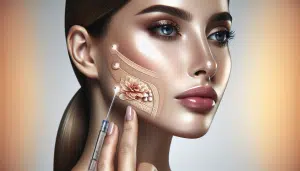You Could Transform Your Skin Routine with Peptides
Charlotte Stone September 25, 2025
Wondering how peptides are changing skincare? This guide breaks down what peptides do, why they’re gaining so much attention, and how to work them into a modern beauty routine. Learn about peptide creams, serums, and how peptide-rich formulas could refresh your approach to wellness and beauty.
What Are Peptides and Why Do They Matter for Skin?
Many people have noticed the word peptides appearing on their favorite skincare products lately. Peptides are short chains of amino acids—the essential building blocks of proteins like collagen and elastin, two substances that help skin stay firm and smooth. Unlike larger proteins, peptides are tiny enough to pass into the skin’s outer layers. This lets them encourage the body’s natural repair processes, making them a valuable addition in facial creams and anti-aging serums. Skincare innovations increasingly include peptide blends, suggesting ongoing research and recognition of their unique potential. Many consider peptides to be central to rejuvenation-focused wellness.
But what makes peptides an appealing choice for those seeking healthier, more radiant skin? The science lies in communication. Skin recognizes many topical peptides as biological messengers. When applied through a serum or cream, certain peptides signal skin cells to complete repair functions or boost collagen production. For those dealing with fine lines, loss of volume, or dullness, products with peptides offer a new approach that doesn’t rely solely on exfoliation or retinol. Many modern peptide-rich formulas ditch harsh ingredients in favor of more targeted, skin-friendly options that suit a wide variety of complexions.
Peptide creams and serums have also become popular because they work well in multi-step routines. Used after cleansing and before heavier moisturizers, a peptide serum can deliver these bioactive ingredients deeper into the skin. Many find they combine well with antioxidants such as vitamin C, enhancing overall results and comfort. As personal approaches to self-care continue to evolve, interest in topical peptides is set to climb, offering new, science-backed rituals for anyone eager to maintain a youthful, energized appearance. Learn more about how peptides interact with the skin barrier (Source: https://www.ncbi.nlm.nih.gov/pmc/articles/PMC6835901/).
The Science of Peptides in Skincare Routines
Understanding why peptides are so valued in skincare starts with their science. Collagen and elastin gradually deplete as people age, which can lead to thinner skin and more prominent wrinkles. Peptides act as mini-messengers, sending signals that trigger new collagen synthesis. Studies have found that certain peptide complexes applied topically can stimulate production and reduce visible signs of aging. As the demand for evidence-based skincare grows, scientists continue to investigate which peptide types are most effective for maintaining the skin’s youthful look (Source: https://www.ncbi.nlm.nih.gov/pmc/articles/PMC3583886/).
Not all peptides work the same. Some, called signal peptides, instruct cells to make more collagen, while carrier peptides help deliver essential minerals. Other formulations use enzyme-inhibitor peptides to slow the breakdown of collagen in the skin. Each of these types brings distinct benefits, from smoothing fine lines to improving elasticity. Formulators balance these functions to create multi-action products, contributing to the development of creams suitable for mature, sensitive, or stressed-out skin. The flexibility of peptides in skincare is a main reason for their popularity across all age groups.
Many skin professionals recommend pairing peptide products with regular sun protection and gentle cleansing. While peptides are powerful, their results are boosted when routines include other barrier-supporting steps. Consistent application over several weeks shows the best results, building on skin’s natural cycle of renewal. For those with concerns about sensitivity, most peptide-based serums are designed for comfort, making them a fitting option for daily care. Research continues to clarify the ideal peptide concentrations for optimal effect in at-home routines. If you are curious about integrating peptide complexes, consult resources from dermatology associations for further insight (Source: https://www.aad.org/public/everyday-care/skin-care-secrets/routine/ingredients).
Choosing Peptide Products for Your Skin Goals
Shoppers exploring peptide-rich skincare may be surprised by the variety of formulas on the market. Serums, moisturizers, and even overnight masks now feature different peptide complexes tailored for specific concerns. People seeking firmness and visible smoothness often gravitate toward peptide serums with complementary hydration boosters like hyaluronic acid. Meanwhile, individuals with sensitivities may opt for minimal-ingredient peptide creams created to calm troubled complexions. The customization potential means that nearly anyone can find a viable peptide product for their unique routine.
Formulation matters when picking a peptide skin cream. The effectiveness of a peptide formula depends not just on the type and concentration of peptides, but also on supporting ingredients that help stabilize and deliver them. Look for clinical testing or dermatologist reviews when considering new options. If integrating a new peptide cream into your routine, patch testing is a simple step to help prevent irritation or allergic response. With continued innovation, new blends are in constant development, making it easier to experiment and discover the textures, scents, and finishes that best suit your skin.
Peptide formulas tend to work well in concert with other high-performance actives, such as niacinamide for brightness or ceramides for added barrier support. For those navigating complex routines, peptide-based serums and moisturizers offer a way to target fine lines, support hydration, and boost resilience—all without overloading the skin. Anyone interested in adjusting their routine can start by adding a single peptide product and monitoring gradual changes. As always, resources from major wellness organizations provide in-depth ingredient analyses (Source: https://www.clevelandclinic.org/health/drugs/23830-skin-care-ingredients).
How Peptides Fit Into Holistic Beauty Rituals
Modern wellness routines embrace a combination of topical and lifestyle elements, where skin is viewed as a reflection of internal balance. Peptides, thanks to their gentle yet powerful nature, fit seamlessly into a holistic regimen. Alongside sleep hygiene, nutrition, and hydration, peptide creams can help maintain a glowing complexion. For those practicing mindful rituals—like facial massage, breathwork, or warm compresses—peptides enhance self-care and relaxation rewards. These everyday habits complement skin’s regenerative cycles.
People with busy lifestyles are choosing smart solutions that support both immediate and long-term skin health. Peptide-infused masks, for example, can be used during short moments of downtime, offering a feeling of luxury with minimal effort. Paired with sun protection and antioxidant serums, peptides assist in fending off environmental stressors. The focus on minimalist, multifunctional skincare lets users streamline their approach and enjoy consistent improvements over time. By blending peptides with other science-driven beauty tools, the path toward balanced, vibrant skin can become routine—and even enjoyable.
Combining peptides with stress-reducing rituals creates a feedback loop of well-being. Many notice more resilient skin, fewer signs of fatigue, and greater confidence after several weeks of regular use. The results vary by formula and individual, but the common theme is steady, gentle transformation. Wellness is about consistency more than quick fixes, so peptide-enriched skincare fits well into realistic, long-term beauty goals. For further advice on building a holistic self-care strategy, review guides from major dermatological research foundations (Source: https://www.dermatology.org/skin-care-tips).
Understanding the Benefits and Considerations of Peptides
Peptides offer a unique profile in the world of advanced skin care ingredients. People using peptide skin serums often report smoother texture, improved tone, and increased hydration. Some peptides are designed to specifically target areas of visible aging, such as crow’s feet or forehead lines. Others help strengthen the skin barrier, reducing the look of redness or dehydration. Skincare professionals highlight that patience and consistency with peptides generally result in noticeable changes in a matter of weeks or months.
Despite the visible improvements, there are factors to consider before fully committing to a new peptide routine. Not all products deliver the same results—factors like molecular weight, formulation, and ingredient synergy come into play. Some individuals may notice faster or more significant changes, while others with highly sensitive or reactive skin should watch for mild irritation. For best practice, consider consulting a dermatologist when transitioning to potent peptide blends. Look for published clinical trials that verify product claims and report both benefits and risks.
Peptides are safe for most users, but as with any new ingredient, a gradual approach is best. Start with lower concentrations and increase usage over time to observe skin’s response. The skin’s needs may evolve, so routines may also need to change. By regularly checking in with reliable resources and personalizing application methods, people can maximize peptide benefits while avoiding common pitfalls. Ongoing research and evolving expert advice make the exploration of peptide-powered skincare both engaging and science-forward (Source: https://www.ncbi.nlm.nih.gov/pmc/articles/PMC6335496/).
The Future of Peptide-Based Skincare
Peptides are more than a fleeting trend in beauty. Ongoing research suggests they have potential for long-term skin rejuvenation. Next-generation peptide complexes are being studied for their ability to address pigmentation, sensitivity, and even acne-prone skin. As consumers demand results grounded in research, cosmetic science is stepping up with more sophisticated, personalized solutions. Peptides are likely to remain at the heart of the next wave of skin health innovation.
In the race toward ingredient transparency, many brands are now disclosing not just the types but the specific percentages of peptides in their products. This shift empowers users to make informed decisions and track what works. Coupled with sustainable packaging and cruelty-free development, the peptide movement is also contributing to a more ethical, planet-friendly beauty landscape. The advances in biotechnology point to a future of skincare that’s both powerful and gentle, revolutionizing how people care for their skin at every age.
The future is bright for those who love discovering science-backed wellness and beauty trends. As more data emerges, expect peptide-rich creams and serums to become even more effective, targeted, and accessible. For anyone curious about innovative approaches to skincare, peptides offer a window into how modern ingredients blend nature, technology, and self-care. To stay updated on the latest findings, follow publications from research institutes that specialize in dermatological advancements (Source: https://www.sciencedirect.com/science/article/pii/S0923181119302414).
References
1. Ezzedine, K. et al. (2019). Skin barrier and peptides: effects and applications. Retrieved from https://www.ncbi.nlm.nih.gov/pmc/articles/PMC6835901/
2. Lupo, M.P. & Cole, A.L. (2007). Cosmeceutical peptides. Retrieved from https://www.ncbi.nlm.nih.gov/pmc/articles/PMC3583886/
3. American Academy of Dermatology Association. (n.d.). Skin care ingredients. Retrieved from https://www.aad.org/public/everyday-care/skin-care-secrets/routine/ingredients
4. Cleveland Clinic. (n.d.). Skin care ingredients guide. Retrieved from https://www.clevelandclinic.org/health/drugs/23830-skin-care-ingredients
5. International Dermal Institute. (n.d.). Professional skin care tips. Retrieved from https://www.dermatology.org/skin-care-tips
6. Rieger, M. et al. (2019). Advances in peptide-based cosmeceuticals. Retrieved from https://www.sciencedirect.com/science/article/pii/S0923181119302414







